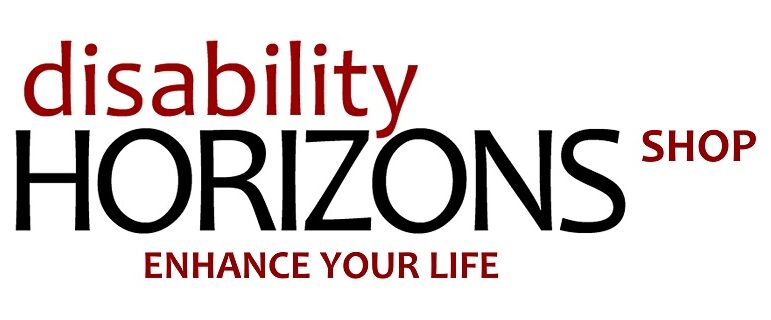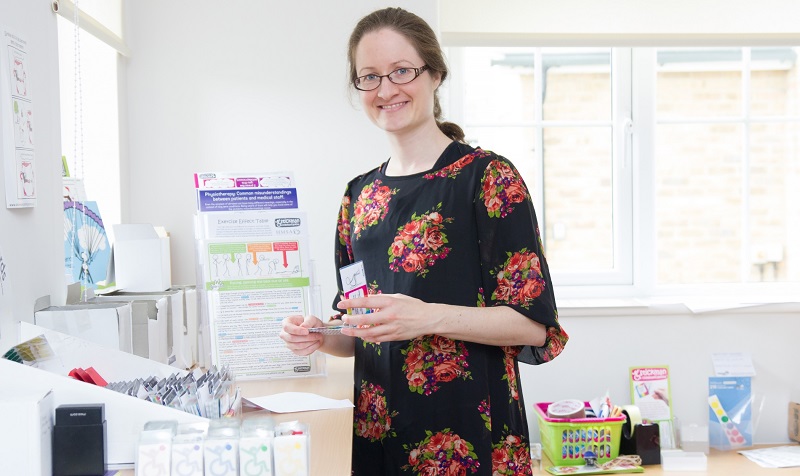Earlier this year, we launched our new shop, selling a wide range of stylish disability living aids. We only supply high-quality products from trusted suppliers, many of whom have created their products based on their experiences as a disabled person.
That is certainly true of Hannah Ensor, founder of Stickman Communications. Find out more about her and how her life experiences have shaped her business.
Please tell Disability Horizons readers a bit about yourself and your background.
I’m Hannah and I have hypermobility syndrome, which causes over-flexible joints that cause pain and fatigue, and Postural Tachycardia Syndrome.
But I grew up not knowing this. I knew that I was ‘different’ from other people at school, but I didn’t know why.
Several of my siblings, and probably my parents, have hypermobility as well, so there were a lot of things that were normal within our family.
It meant that mum would encourage us to pace ourselves without realising it. She’d suggest quiet activities after school, such as crafts and board games. She knew that if I had friends over several days in a row I would get too tired to cope.
She also worked out that I got injured more easily and took longer to heal than doctors expected, another feature of my hypermobility.
I wasn’t diagnosed until I was 22 with hypermobility. I had just completed a degree in environmental health and started work as an environmental health officer, working in private sector housing.
My symptoms were gradually worsening and had become disabling. A few years later I was also diagnosed with Postural Tachycardia Syndrome as well (PoTS).
During this period I discovered the Hypermobility Syndromes Association, through whom I was able to understand my body and start to learn how to manage my conditions.
As my symptoms worsened, I increasingly struggled with work. By the age of 23, I’d switched to a desk-based role instead of an inspection-based one. Soon I reduced my hours to part-time.
In 2010, it became clear that I couldn’t continue and I was medically retired. At the time it was horrible as I felt as though I was losing who I was.
In hindsight, I wish I’d left work sooner. Being at home allowed me to rest when I needed and to focus on gradually building my strength.
I learned how my body reacted to things and how to look after it. I run my business, Stickman Communications, from home. It enables me to take breaks, change position and adapt tasks in whatever way I need to.
Can you tell us about your business, Stickman Communications?
We at Stickman Communications create and sell products featuring stickmen cartoons that have both charm and humour.
The stickmen help to create an understanding of the symptoms and needs of people with a wide range of disabilities and conditions. They communicate information quickly and positively, yet realistically.
We also aim to break down barriers of misunderstandings and misconceptions, and enable self-management.
The products we sell include:
- cards
- sings
- stickers
- books
- sticky notes
- pin badges
- posters
- wristbands.
Visit Stickman Communications on the Disability Horizons Shop to see a selection of our products.
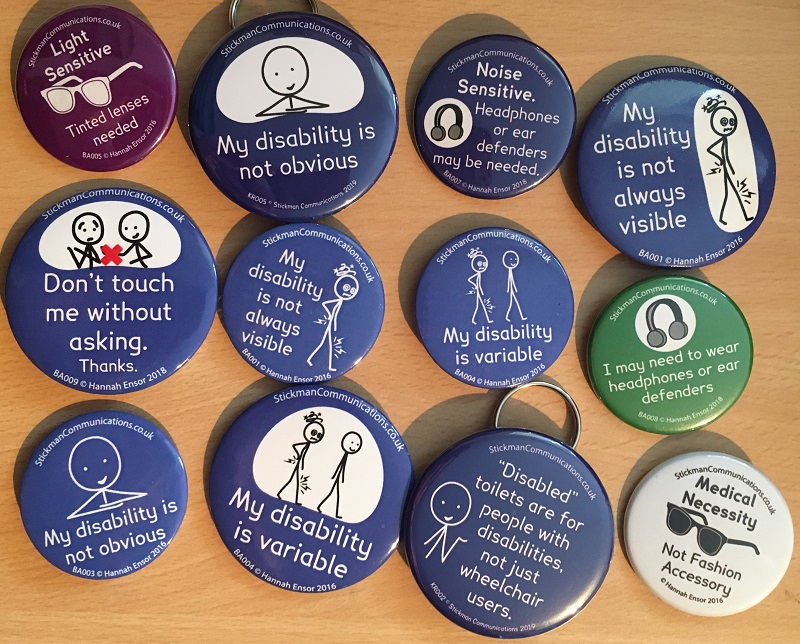
Aside from allowing you to work more flexibly, how has your disability influenced your business?
When I was 23, I had to stay in hospital due to my then undiagnosed PoTS. It causes my blood to pool instead of circulating, so I can get stroke-like symptoms from sitting, standing, and overheating.
At the time, I couldn’t put a sentence together. But I found that I could draw ‘stickmen’. The stickmen, combined with straight-forward, simple written explanations, got the messages I was trying to communicate across well.
I also drew stickmen living with hypermobility syndrome. I shared these on the Hypermobility Syndromes Association’s online support group and people loved them. So I created a card and booklet about hypermobility syndrome using stickmen in order to raise awareness.
They made it easier for me and my ‘bendy’ friends to explain our condition. Soon enough, people with other conditions wanted them too, so Stickman Communications was born!
Our products, blogs, and talks are used worldwide by people with disabilities and medical professionals.
How do your disabilities affect your day-to-day life and what challenges have you overcome?
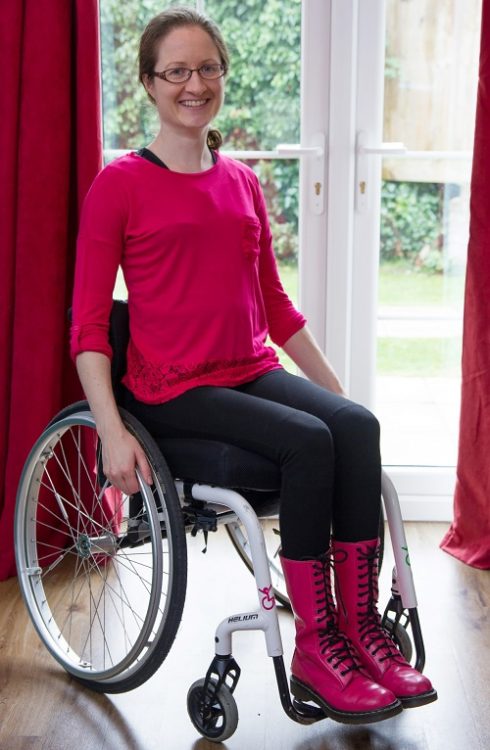
My conditions affect every aspect of my life. What I eat and when, what I wear, where I go, how I travel, when I work – even the basics of bathing.
With hypermobility, people often assume that the main problem is pain. For me, the pain was a major factor when I was first diagnosed. But as my management of it improved, my pain, although still present, is less restrictive.
The fatigue, brain fog, and coordination issues that come with having both hypermobility and PoTS are far more limiting.
PoTS affects my blood flow to the brain when I stand, sit still for too long, raise my arms above my head, eat, talk, change position quickly, or am too warm. Sometimes even a pleasantly warm 22°C can leave me unable to function.
This means that I use a wheelchair when out and about, and sometimes at home too. But because both of my conditions worsen if my muscles weaken, I also have to still walk and exercise as much as I can.
This has to be done carefully though so that I don’t injure myself, so I pick and choose what activities work for me.
For example, I very rarely cook because standing by a hot oven will affect my coordination within minutes. Poor coordination plus hot dishes is NOT a good idea!
Knowing my limits, adapting and changing how I react to things has meant that, although in some ways my underlying condition is worse, I have been able to build a lifestyle that suits me. At 37 my life is now far better than the 24-year-old me could have dreamed of.
Can you talk about the practical side of running a business with a disability? Do have help from PAs or employees?
One of the most important things to have contributed to my business success is having realistic expectations.
To start with, I wanted to say yes to every opportunity and be super quick with everything. The reality is that, with my body, that isn’t sustainable.
I started saying no when I needed to and I was surprised to find that instead of losing business, I gained it. People knew where they stood so I was able to deliver what I promised.
I have a PA who helps with some personal tasks, but she is also essential to running my business. Two of her main tasks are packing orders and monitoring my ideas. Concentrating while bending down and selecting items for packing was just too much for me.
I can also bounce ideas off her to make sure I’m not missing anything essential and that I’m talking sense and not brain fog. Having someone who recognises rising symptoms and queries whether I should be working is invaluable!
I also harness the power of social media regularly scheduling posts in advance – especially if I know I’m headed for a rough few days.
The combination of technology and a PA means I can take time off without everything crumbling. It’s sustainable even through times when my health is poor.
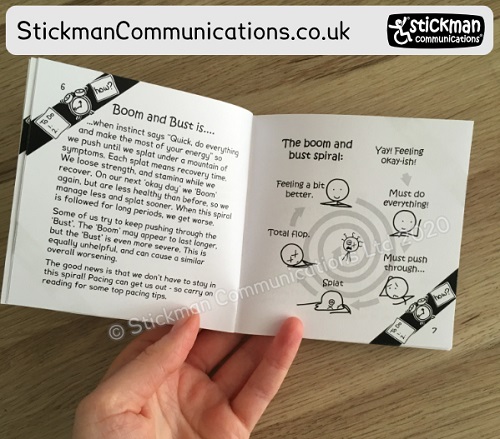
You’ve set up a blog alongside Stickman Communications. How did you start it and what do you write about?
My blog started before Stickman Communications was a proper business – when it was just a small fundraising project. I guess it started as simply something to do.
But now I share things I discover or experience that I think might help other people living with long-term conditions.
I also share things that might help non-disabled people to understand and relate to us disabled people more easily. I hope that this helps them to see that there is so much more to life than disability!
You can visit my blog at stickmancommunications.blogspot.com.
You’ve created a range of products in response to the Covid-19 outbreak. Can you tell us more about them?
Like with most of our products, the Covid-19 range happened because people asked for them. Many of our customers are within the ‘shielding’ group or are self-isolating.
They wanted a way to remind people to stick to the 2m distances, and about issues around immuno-suppression, but in a way that was light-hearted rather than officious.
Of course, ‘get the message across but in a fun way’ is the reason my stickmen exist – so I couldn’t say no!
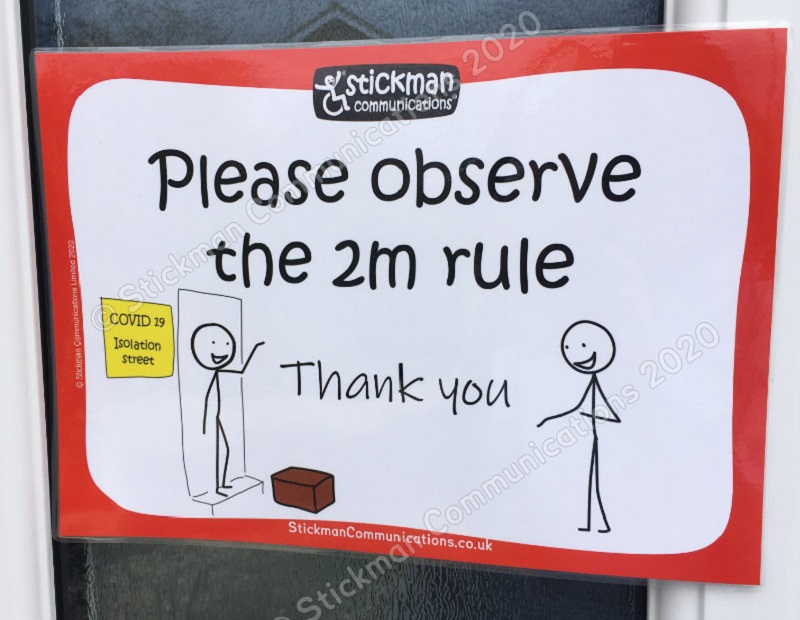
Why did you join forces with Disability Horizons and start selling some of your products on our shop?
I’ve been a follower ever since Disability Horizons (DH) was founded by Martin and Srin, and it’s been great to see the positive and realistic approach it takes.
It recognises that, although there are lots of challenges that come with having a disability, there is also a life worth living. DH provides a real-life perspective and advice based on lived experience, which is so incredibly valuable to the disabled community.
The work DH and Stickman Communications does is very well aligned. We both want to help people to get the support and understanding they need and to live their lives in the way they want to. So working together made complete sense.
Do you have any big plans moving forward at your company?
To keep growing! We’ve just launched new cards explaining Multiple Sclerosis, and have lots of other exciting projects on our list of things to create.
What advice do you have for other disabled people who want to start their own businesses?
Do something you love. Starting a business is hard work and if you don’t enjoy it it will quickly become a burden. If you enjoy it, it will become a lifestyle!
By Shannon Kelly
More on Disability Horizons…
- Visit the Disability Horizons Shop to buy stylish disability living aids
- 8 disability living aids to help with everyday tasks at home
- The family behind the innovative Trabasack wheelchair lap tray and bag
- Assistive technology: top 5 smart home devices to assist your everyday life
The post How Hannah Ensor used her disabilities to create a business appeared first on Disability Horizons.
